From The Chair
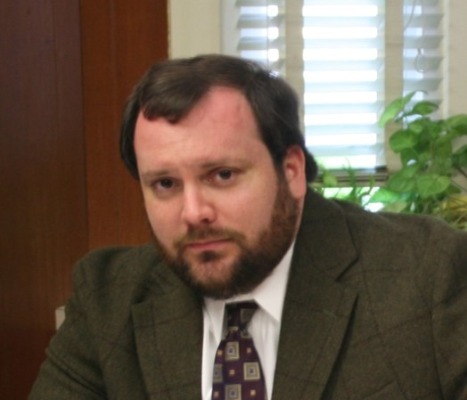
It has been an exceptionally difficult year for the Department of History. Several members of the faculty lost close friends and family members, and our departmental family suffered an especially grievous loss this September.
Our friend and colleague Craig Miner passed away after a long illness. Craig leaves behind a tremendous body of published work and a long (over forty years) record of service to WSU.
We have also had to deal with a spate of retirements, most recently our medievalist, Professor Anthony Gythiel. While these events have left us a bit short-handed, we remain confident that we will be able to fill our open positions in the near future. We are also soliciting donations for a Craig Miner memorial award fund for our graduate students. Appropriately, the award will provide additional monies for our graduate students to make research trips and attend academic conferences.
As always, we remain truly grateful for the wonderful support of our alumni, and hope that we can continue to serve you, the University, and the community.
Sincerely,
Robert M. Owens
Student Awards and Honors
Every year among its various other duties, the faculty of the history department faces the difficult but pleasant task of awarding departmental scholarships and prizes. It is difficult in that it is hard to select between so many worthy candidates. Pleasant in that, thanks to the generosity of our benefactors, we were able to distribute over $7,500 in scholarships and awards. The department is proud to recognize the following students for their academic achievements. In the category of paper awards: Michael Ables was the recipient of the Douglas Bendell Undergraduate Research and Writing Award for his paper “NASA: The Infancy of the U.S. Space Program, 1958-1961.”
In the graduate paper category, Hugo Marquez was the winner of the Fiske Hall Seminar Paper for his submission “Understanding Homosexuality in Postwar Kansas” and Harvey Munshaw was recognized for the Fiske Hall Non-Seminar Paper for “Preparing for Future War: The Soviet Military and Industrial Buildup from 1924 to 1933.”
The following students received recognition for their undergraduate aca-demic achievement by receiving these undergraduate scholarships. Jill Heisler was selected for both the Henry and Minnie Onsgard and the Russell “Jiggs” Nelson Scholarships. Sunny Scharn-horst was the recipient of the Con-stance Louise Routh Decker-Daughters of the American Revolution Scholarship and Christopher McRae received the Lee and Helen Kamen Scholarship. Angela Sager garnered the Donna and Bill Ard Scholarship and Gregory Nordyke grabbed the Marie Graham Memorial Scholarship.
Although the selection process is difficult at every level of the awards, choosing among our graduate students traditionally poses the greatest challenge and this year was no exception. Among many worthy candidates, the Department selected Hugo Marquez to receive the Anthony and Dana Gythiel Endowed Fellowship. After much discussion, the Department was unable to decide between two noteworthy graduate students for the John Rydjord Graduate Award. In deference to the high regard the faculty has for both students; Carl Lund and Emily Long were named co-recipients of the Rydjord Award.
This year was an especially poignant one for the Department as it marked Craig Miner’s last turn at awarding Departmental prizes. We all will surely miss his wise judgment on the difficult task of selecting among our many note-worthy students. Congratulations to all our winners and many thanks to our benefactors who make this support of our students possible!
Speaking of honors, Dan Papsdorf won the 2010 campus-wide Dora Wallace Hodgson award for Outstanding Master's Thesis for his, “Trade, Diplomacy and War Along the Waters: The Mississippi During the American Revolution.”
In Memoriam: H. Craig Miner
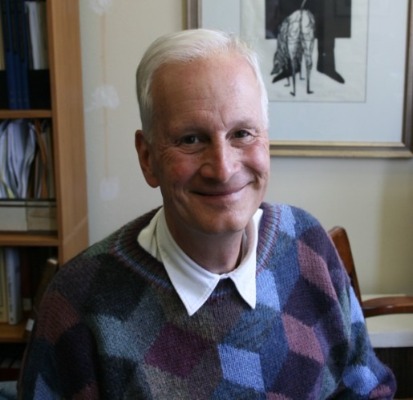
H. Craig Miner, Willard G. Garvey Distinguished Professor of Business History, passed away on Sunday, September 12, after a long illness. Professor Miner leaves behind an impressive body of published works, including Wichita: The Magic City, West of Wichita: Settling the High Plains of Kansas, 1865-90, Next Year Country: Dust to Dust in Western Kansas, 1890-1940; Kansas: The History of the Sunflower State, 1854-2000; and Harvesting the High Plains: John Kriss and the Business of Wheat Farming, 1920-1950, among others. His last book, A Most Magnificent Machine: America Adopts the Railroad, 1825-1862, has just come out. He was the acknowledged dean of historians of Kansas, giving Wichita and western Kansas much deserved scholarly attention. He was passionate about the history of business and technology, but also had deep loves for classical languages, music, astronomy, and even sports cars. He was also a beloved teacher to generations of WSU students. He served the Department, the University, and the community with great skill and commitment for more than 41 years. His loss is, and will long remain, sorely felt.
In honor of Craig Miner’s passion for research, the Department of History is establishing a fund to help pay for graduate student research trips. If you are interested in supporting this venture, please contact the department at 316-978-3150.
Public History Program
2009-2010 seems to have been a time of change for a number of students of the Public History Program. Traci Skrdla and James Crawley both finished their degrees. Several students still in the program have moved to take advantage of new opportunities. One student, Doug Miller, has even gone overseas to serve as the historian for the 39th ABW, at Incirlik Air Base in Turkey.
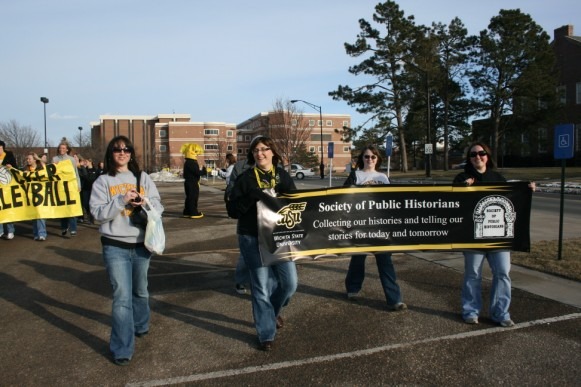
The Society of Public Historians remains active on a variety of projects. In the spring, several SPH students attended the Kansas History Teachers Association Conference at Kansas City and one, Bethany Kennedy, attended the National Council of Public History meeting in Portland, Oregon. A team of students held a workshop on the use of Facebook at the Kansas Museums Association conference in El Dorado.
The program could not continue without the support of our adjunct instructors. Bob Keckeisen continues to teach our museum administration class while Dr. Lorraine Madway from Special Collections and University Archives teaches an archives class and taught a class on public memory in the spring.
You can find graduates and students from the Public History Program in a variety of places. One alum works for the Kansas Sports Hall of Fame. Another operates her own historic preservation consulting firm. Others work for museums, archives, records management programs, and in historic preservation activities.
Tony Gythiel busy as ever in retirement
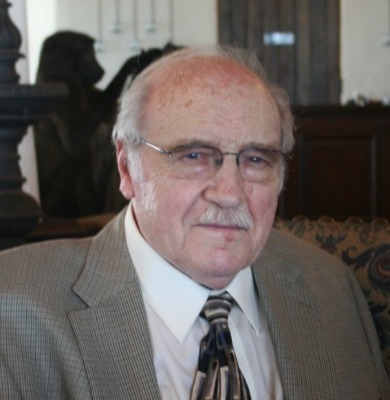
In May 2010, the Department of History held a farewell banquet at the Petroleum Club in honor of Tony Gythiel’s retirement.
Even so, Professor Anthony Gythiel keeps his mind active. At present, he is working on two translations. The first is from a German work by Gabriel Bunge, under the title Akedia. Die geistliche Lehre es Evagrios Pontikos vom Ueberdress. (In English: Akedia. The Spiritual Teaching of Evagrius of Pontus on Despondency). Evagrius lived in the fourth century and was a theologian in the Kellia in Egypt.
The second book, in French, is of a key work by Jean Daniélou, and is entitled Platonisme et théologie mystique. La doctrine spirituelle de saint Grégoire de Nysse. (In English: Platonism and Mystical Theology. The Spiritual Teaching of St Gregory of Nyssa). Gregory of Nyssa (fourth century) is presented in this work as the founding father of mystical theology in the East.
Fairmount Folio
Volume Twelve of the student history journal, the Fairmount Folio, was published in May. Hugo Marquez served as student editor. This volume included articles on topics in American history and Soviet history. Volume Thirteen is already under way.
Faculty News
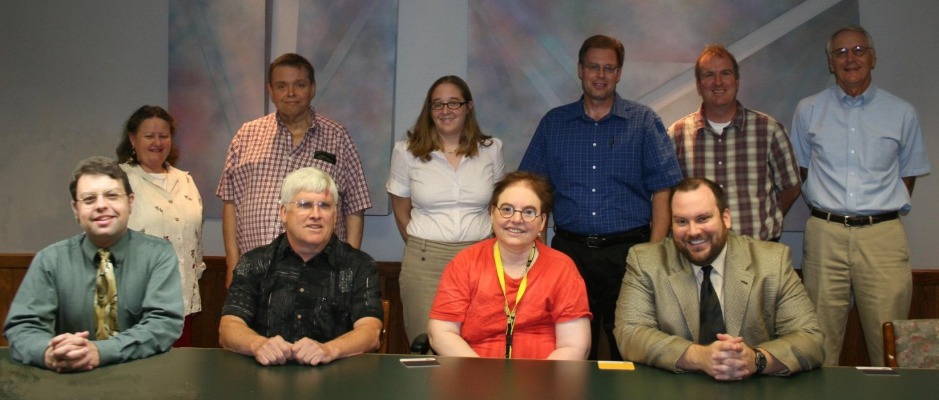
Another busy year for George Dehner began with an early January trip to the Gerald R. Ford Presidential Library and Museum in Ann Arbor for archival research. In early February, George was invited to meet with Biology faculty and graduate students to discuss his research on influenza and present a lecture “Do You See What I See?: Influenza and the WHO Surveillance System” for the Biology Seminar Series. The Spring Semester marked the development of a new course on global pandemics that George created for the Honors Department and a cadre of students enrolled for this new offering. Some longer-ranged research projects came to fruition this year. George’s article “WHO Knows Best? National and International Responses to Pandemic Threats and the ‘Lessons of 1976’” was accepted for publication by the Journal of the History of Medicine and Allied Sciences. The article was e-published in March and can currently be found in the printed copy of the October edition. Another, larger project, also found a home as the University of Pittsburgh Press contracted to publish George’s manuscript tentatively titled Reexamining a Fiasco: Influenza in the Long Twentieth Century. The book is scheduled to be the inaugural work in Pittsburgh’s new series on the World History of Science. In addition, a press from the United Kingdom has solicited from George a longer-term, broader global history of influenza and he is currently at work drafting this proposal.
As usual, George has his full slate of courses and graduate theses and like the entire faculty, his classes are overflowing with students. George spends his off-hours teaming with his wife Jodi to corral their three boys Brendan, Patrick, and Sean. All-in-all, more than enough to keep those idle hands busy.
Europeanist John Dreifort continues to serve as the department's graduate coordinator in which capacity he tries not to ruin too many budding careers.
He also advises undergraduates in the International Studies major. He is serving his thirty-fifth season as Executive Secretary of the Wichita Committee on Foreign Relations, a "town and gown" organization started by President Harry Corbin in 1956, that meets monthly to consider matters of U.S. foreign policy, national security issues, foreign trade and the like.
He has been selected to serve on the steering committee of the Kansas Department of Commerce Global Perspectives, a program designed to provide Kansans with a greater global awareness and empower them to become global citizens. He continues to work on his book manuscript about the relationship between Eisenhower and De Gaulle during World War II.
Robin Henry had another busy year at WSU. In the fall of 2009, Henry completed her manuscript “Criminalizing Sex, Defining Sexuality: Sexual Regulation and Masculinity in the American West, 1850-1927” and submitted it to Cambridge University Press. After being positively reviewed by the acquisitions editor, the manuscript was sent on to anonymous readers for further review. In addition to completing and submitting her manuscript, Henry finished two shorter writing projects: an article, “‘In Our Image, According to Our Likeness’: John D. Rockefeller, Jr. and Reconstructing Manhood in post-Ludlow Colorado,” which was accepted by the Western Historical Quarterly, and an article-length encyclopedia entry, “Gender and Gender Roles,” for the book American Centuries: The Ideas, Issues, and Trends that Made U.S. History, volume four: 19th century, both of which are forth-coming in 2011. Henry also received the Littleton-Griswold Grant for Legal History from the American Historical Association, which will allow her to begin work on her second book-length project, “The Progressives’ Lincoln: Benjamin Barr Lindsey and the role of law in the Progressive Movement,” as well as complete an article, “Lindsey’s Kids,” Ben Lindsey’s Juvenile Court and the Construction of Modern Childhood,” slated for submission to the Journal of the Gilded Age and Progressive Era, by the end of 2010. In addition to her writing projects, Henry attended two conferences: the annual meeting of the Organization of American Historians in Washington, D.C. in early April where she completed her service on the Committee on the Status of Women, and the “Little Berks” the interim meeting of the Berkshire Conference of Women Historians in South Hadley, Massachusetts in early June. At the Little Berks, she served on the conference planning and program committees for the upcoming Fifteenth Conference on the History of Women to be held in June 2011. In addition, Henry was selected to serve on the editorial board of H-SHGAPE, the online database for the Society of Historians of the Gilded Age and Progressive Era, was reelected for a second term as a LAS Senator for the Faculty Senate, and began serving on the undergraduate research committee for the university. Though professional activities at WSU and in the larger historical profession remain important to her life, she found her community talk on John D. Rockefeller, Jr. and the Employment Representation Plan that she gave to her grandfather’s Men’s Club in Overland Park, Kansas to be one of the most rewarding experiences of the year.
Helen Hundley’s article “Defending the Periphery. Tsarist Management of Buddhism,” appeared in the April edition of Russian Review. She continues to
serve as faculty adviser for the Fairmount Folio and as the Russian and East European Book Review Editor for the national journal of the history honorary, Phi Alpha Theta, The Historian. She plans a return to Siberia next summer, to begin new research.
Willard Carl Klunder published several book reviews: Roll Call to Destiny: The Soldier's Eye View of Civil War Battles, by Brent Nosworthy, in the Journal of Southern History; Political Moderation in America’s First Two Centuries, by Robert McCleur Calhoon, in the Journal of American History; Jayhawkers: The Civil War Brigade of James Henry Lane, by Bryce Benedict, in Civil War Book Review; and John Bankhead Magruder: A Military Reappraisal, by Thomas M. Settles, in the Military History of the West. Dr. Klunder continues to serve on numerous faculty committees, and is an at-large member of the Faculty Senate.
This past year Ariel Schwendner Loftus presented a paper on single men in aristocratic Athenian families at the annual meeting of the Classical Association of the Middle West and South in Oklahoma City. A revision of the paper accepted for the first meeting of the American Society for Greek and Latin Epigraphy and being further revised for publication. She reorganized her book manuscript about women in Athens, a sourcebook of translated documents from 470 to 70 b.c. to include 9 chapters on various topic including religion and prostitution. She hopes to use it in the graduate seminar next semester.
Robert Owens managed to survive both the tenure and promotion process and his first year as Chair of the Department of History. With great pride he not only saw his student Dan Papsdorf successfully defend his M.A. thesis, “Trade, Diplomacy and War Along the Waters: The Mississippi During the American Revolution,” but also join the History Ph.D. program at Duke University. Owens taught his American Colonies, American Revolution, and Survey of the American Indian courses, as well as the required Historiography (History 698) and Introduction to Research and Writing (History 300). He hopes to finish and submit his second book-length manuscript, “Pan-Indianism and Panic: How the fear of Indian Confederacies shaped Anglo-America, 1763-1815,” to a university press by the end of this year.
Keith Pickus continues to serve as Associate Provost for the university and is actively involved in strategic planning initiatives for the Division of Academic Affairs and Research. This past April he delivered the keynote speech for the State Holocaust Commemoration event that was held in Topeka.
Jay M. Price began 2010 with the release of Wichita’s Lebanese Heritage, a book whose team of authors included recent graduate Matthew Namee. The summer and early fall have involved several projects, including finishing up on the preliminary manuscript of Temples for a Modern God, a study of religious architecture after World War II. He is in the process of putting a team together to do the next photo-based book, this time, exploring Tornado Alley as both a region and cultural construct. He continues to serve on the board of the Kansas Humanities Council, the State Historic Sites Board of Review, and has recently joined the board of the Wichita Sedgwick County Historical Museum.
This year Niall Shanks, Curtis. D Gridley Distinguished Professor of History and Philosophy of Science has co-authored a book with Ray Greek, M.D., FAQs about The Use of Animals in Science: A Handbook for the Perplexed, and has given the following public presentations: “Good Science and Ethical Practice,” keynote address to GRASP conference, Wichita State University. “Immunology as Darwinian Ecology,” public lecture in the Honors Program Lecture Series, Wichita State University. “Evolution and Medicine,” and “Intelligent Design and the New Darwinians.” Two public lectures at Southwestern College, Winfield, Kansas, and, last February," Perspectives on the Science and Ethics of Animal-Based Research," a panel discussion at UCLA. Shanks is currently organizing the annual SWARM division meeting of the American Association for the Advancement of Science to take place at WSU in April 2011.
Craig L. Torbenson continues serving as the undergraduate advisor for the department. His co-edited book, Brothers and Sisters: Diversity in College Fraternities and Sororities (published in 2009) has received some interest as a potential film documentary. He is currently working on an article about a North Dakota businessman and a sports history manuscript. He continues his interest in family history by volunteering at the LDS Family History Library and teaching “Your Family in History” at Wichita State. In the spring he is offering a new course on using the internet in family history research.

Richard Todd’s new book!
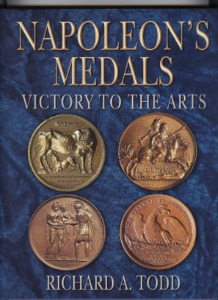
Richard Todd, emeritus professor, continues his scholarly work with the recent release of Napoleon’s Medals. This work explores Napoleonic history through the medals that Napoleon commissioned to mark various conquests and events.
Todd’s interest in the subject began forty years ago, when he started collecting the medals for their portrayal of classical imagery. In time, he became fascinated with Napoleon’s use of ancient symbols as tools to legitimize his actions. Today, Todd has a collection of about 170 medals.
In late October, Dr. Todd held a release and signing party to commemorate a personal love of collecting and scholarship that has been decades in the making.
Where are the Alumni?
In most years, Clio’s Correspondence has a long section about alumni and what they are doing. This year, a number of things took place that delayed our usual request for submissions. In order to get Clio out to everyone in a timely manner, we have decided to focus this issue mainly on current activities of faculty and students. In the meantime, we will continue to collect information about our alumni and will talk more about their accomplishments in the next edition. Stay tuned!
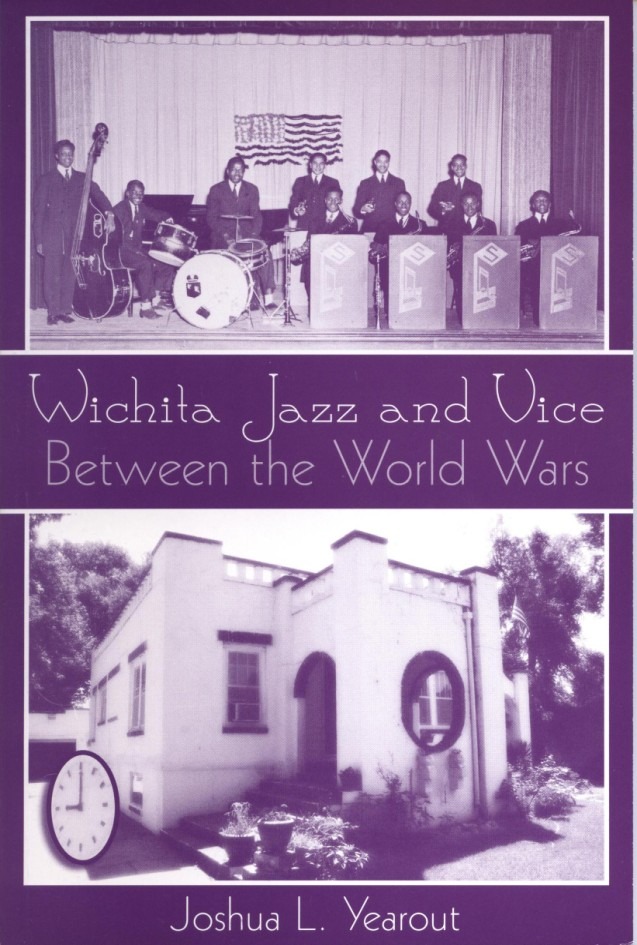
This summer, the family and friends of Joshua Yearout published his thesis about the Jazz scene in 1920s and 1930s Wichita posthumously as Wichita Jazz and Vice Between the Wars. In August, a reception took place launching the book at the Wichita City Arts.

